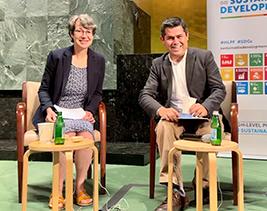Things You Need To Know
5 reasons why science can help the world achieve the SDGs

Achieving the global goals by 2030 will be no easy task. Fortunately, an Independent Group of Scientists (IGS) is working on a new set of recommendations to leverage the power of science to navigate between our economic, social and environmental objectives. The two IGS co-chairs. J. Jaime Miranda and Imme Scholz, shared their ideas about how science can inspire the development transformations we need.
Together with 13 other independent scientists, Mr. Miranda, who is the founding Director of the CRONICAS Center of Excellence in Chronic Diseases at the Universidad Peruana Cayetano Heredia and Head of School at the Sydney School of Public Health and Ms. Scholz, Co-President of the Heinrich Böll Foundation in Germany, will release — the Global Sustainable Development Report 2023 (GSDR) — on 12 September, ahead of the SDG Summit as mandated by UN member States. Here are 5 things you should know about the role of science in our efforts to achieve Sustainable Development Goals (SDGs).
1. Science helps us understand our complex world
Mr. Miranda: “Science, and hence the science behind transformations, is essential to understand and embrace the complexity behind the difficult choices that our countries have to make in order to accelerate towards positive transformations.”
2. Good policies are rooted in science
Ms. Scholz: “Science is essential, but not sufficient in itself. Good policymaking combines scientific insight with social norms and with what people need, want, and are prepared to give. This includes spelling out the costs and benefits of transformation and defining a just transition.”
3. Capacity-building based in science is the backbone of systemic transformation
Mr. Miranda: “The relationship between science and policy is not only natural but also powerful, and capacity is essential to improve this relationship. Capacity-building is therefore the cornerstone behind the transformations that our world needs if we are to envisage a different and fruitful future for humanity. And, to achieve that, we need multiple capacities: to listen, to negotiate, to forecast, to communicate, to engage, etc.”
4. Development of science-based policies are for everyone, everywhere
Ms. Scholz: “We need to increase scientific literacy and restore trust in scientific data and evidence. And countries with strong science and innovation systems need to support countries in Latin America, Africa, and Asia to strengthen theirs.”
5. Science is already proving its worth
Mr. Miranda: “The most recent pandemic showed us that the world and the scientific community can get together, and act together. The development of a safe and effective vaccine against the coronavirus responsible for the COVID-19 pandemic and its delivery in record time, less than one year, confirm that we have the ability and even more, that we can. This type of scientific progress shows us that we can do things, that we can prioritize essential transformations, and that science can work together with policymaking.”
To learn more, stay tuned for the release on 12 September of the Global Sustainable Development Report 2023 (GSDR).
 Welcome to the United Nations
Welcome to the United Nations